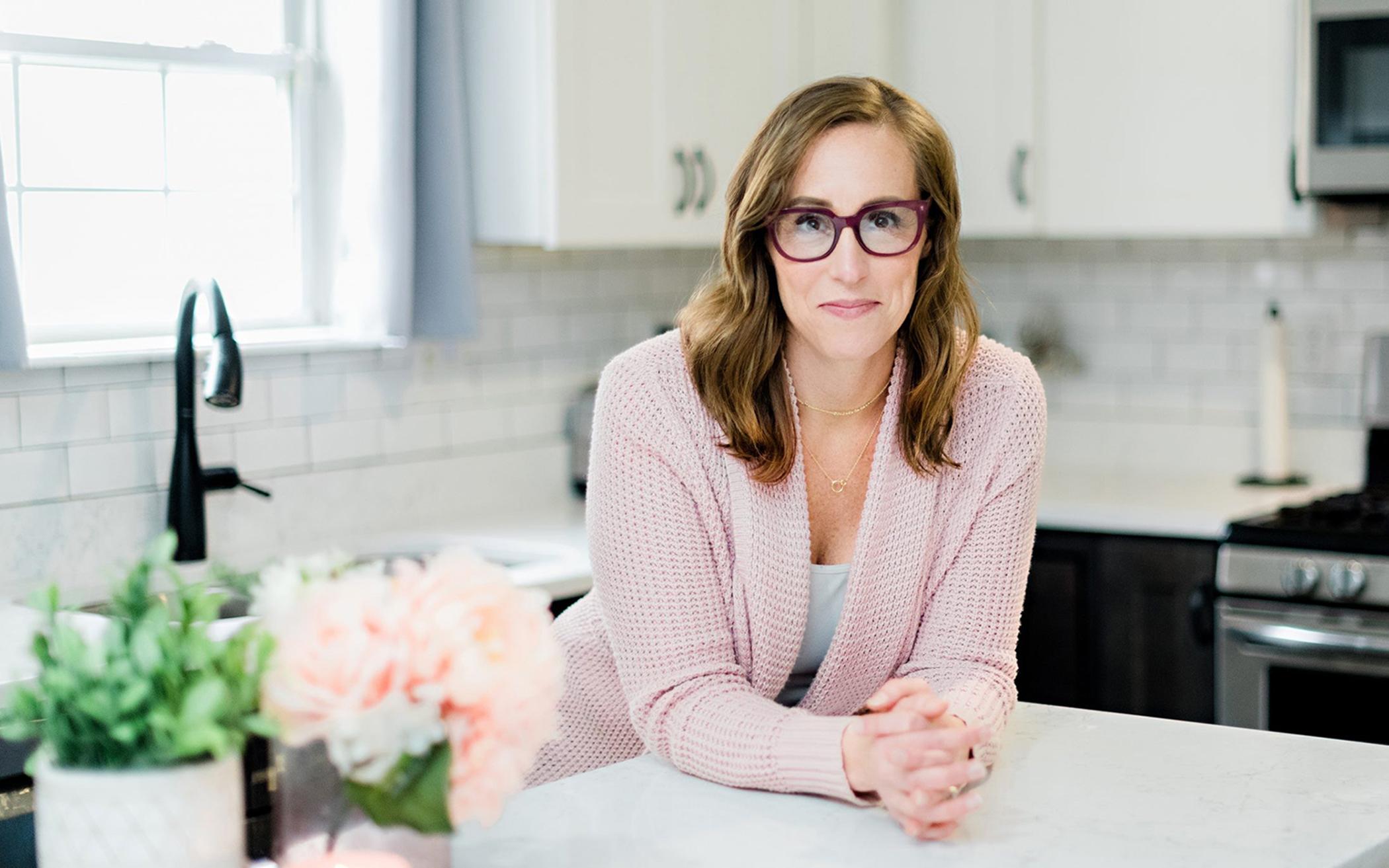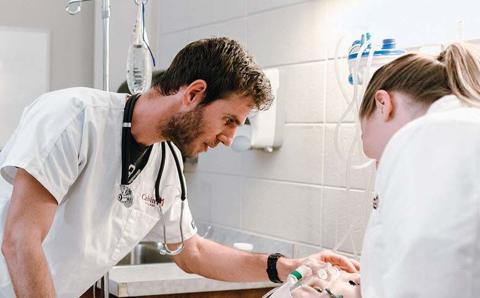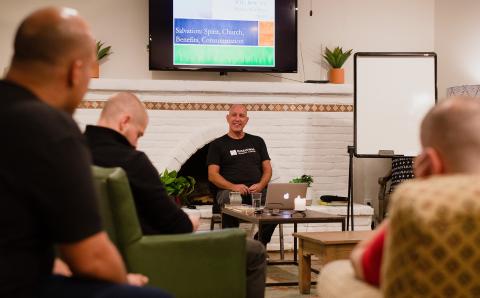The Banner has a subscription to republish articles from Religion News Service. This story by Bob Smietana was published on religionnews.com March 6, 2024. It has been edited for length, Banner style, and to include a paragraph on the Christian Reformed Church’s teaching on life issues.
When Ericka Andersen and her husband started infertility treatment a decade ago, they were hoping for one successful pregnancy.
Andersen, a freelance writer and author who lives in Indianapolis, had married in her early 30s and wanted to start a family right away. When she did not become pregnant after a couple of years, she sought out help and eventually decided to try in vitro fertilization—better known as IVF—in which a woman’s fertilized eggs grow into embryos in a lab and then are transferred to her uterus.
“You are thinking, I just want one of these to work,” she said. “Because for some people it never works.”
After two successful transfers, the couple now has two children, born three years apart. They also have 9 embryos in storage. Andersen said she’s left dealing with “the devastation of extra embryos.”
“I have deep anguish at the lives that I haven’t carried, the siblings of my children that they will never meet,” she wrote in a recent essay about her experience. “The babies I will never know, whose eyes I will not see, whose bodies I will not rock, whose smiles I will not recognize.”
The fate of frozen embryos has been the subject of fierce debate in recent weeks after the Alabama Supreme Court ruled that embryos are “extra-uterine children” and protected by the state’s wrongful death law.
The court’s majority decision alone would have made headlines but was made more controversial by Alabama Chief Justice Tom Parker’s concurring opinion, which quoted the Bible and held that embryos “cannot be wrongfully destroyed without incurring the wrath of a holy God, who views the destruction of His image as an affront to Himself.”
After the ruling, almost all IVF procedures in Alabama were put on pause as fertility clinics try to sort out the implications of the ruling and the state Legislature considers a proposed measure that would shield IVF clinics from liability if “damage or death of an embryo” occurs during treatment.
An attempt to fast-track a U.S. federal bill to protect IVF was blocked in February.
The political discussion since the Alabama decision has overshadowed the deeply personal side of IVF treatment. Patients, often deeply attached emotionally to their unimplanted embryos, can be torn about what to do with them.
Before starting IVF, Andersen said, she prayed she and her husband would end up with only the embryos they needed. Every month when the storage fees for their frozen embryos come due, she starts thinking about their futures.
Donating the embryos to another couple “is the only real option for me,” she said. “I’m not going to destroy them. And I am not going to give them to science because I think they are human beings. They deserve a chance.”
The Christian Reformed Church in North America’s published guidelines for pastoral advice on these matters recognize, “While Scripture does not explicitly teach what moral protection the unimplanted human embryo deserves, it is clear implicitly that as a unique human life it warrants significant human protection.”
In a 2016 paper in the Journal of Law and the Biosciences, Australian legal scholar Jenni Millbank argued that the feelings and insights of women undergoing fertility treatments are often overlooked in discussions about the moral status of embryos. Women often see frozen embryos as siblings to their children or feel connected in other ways. Philosophical or theological concerns aside, Millbank argued, embryos have meaning and value because they matter to the women who could carry them in pregnancy.
Quoting a study participant named Rose, she wrote, “Like many other participants, Rose expressed the view that her stored embryos were closely connected to her through their connection with her existing child or children.”
Nicole Straka, a Realtor from Kearney, Neb., said she and her husband discovered that they had unexpected embryos. After five rounds of IVF, they had eventually become parents and had moved on, busy with raising a pair of twins, who are now teenagers.
But a few years ago, Straka said she got a letter in the mail from a facility that was storing 20 of the couple’s embryos. The letter gave three options, she recalled. The embryos could be thawed, which would make them no longer viable. They could be donated to research, or they could be given to another couple, in a process known as embryo adoption.
Straka decided to donate the embryos to research and gave the facility her credit card number to pay a processing fee. A few months later, the facility told her there had been a delay in processing the disposition of the embryos. In the meantime, Straka said, her credit card had been canceled—and the facility called to ask for a new form of payment.
By that time, Straka had changed her mind. Instead, the couple decided to send the embryos to the National Embryo Donation Center, a Christian group in Knoxville, Tenn.
Related from The Banner: Embryo Adoption: Building New Families in a Unique Way (Sept. 22, 2017); Is Embryo Adoption a “God Thing”? (January 2009)
Some of their embryos went to a couple in Ohio, whose two sets of twins are now biological siblings of Straka’s kids. “They send us pictures and videos all the time and we marvel at how much their kids look like our kids,” she said.
Jeffrey Keenan, director of the embryo donation center, said the Alabama ruling, or any legislation passed in the wake of it, will have little effect on the center’s work. “We don’t anticipate that any national or state legislation would affect us,” he said.
Founded in 2003, the center has accepted thousands of donated embryos from infertile couples, which have yielded more than 1,400 babies. The center plans to hold a celebration this summer for an anticipated 1,500th birth. Some of the donated embryos date to the 1990s.
Even though the state of Tennessee refers to embryos as property, Keenan, a longtime fertility doctor and University of Tennessee medical school professor, prefers to see the center as a caretaker.
“We would be considered owners of those embryos—legally speaking,” he said. “Do I think that’s the right word? No. We are caretakers of these embryos.”
Keenan said he tries to help patients be as intentional as possible during treatment. That includes making decisions about how many embryos they want to create—and what happens to any unimplanted embryos.
Looking back, Andersen wishes she’d thought through the long-term implications of IVF at the start. She’s begun writing more about the process, in hopes that others will learn from her experience.
“I want more people to think through the long game of this,” she said. “This is not just a right now thing. Someday your kids will be born and you’re not going to be dealing with infertility anymore. And then you have to deal with other consequences.”
c. 2024 Religion News Service
About the Author
Religion News Service is an independent, nonprofit and award-winning source of global news on religion, spirituality, culture and ethics.









